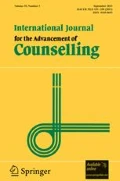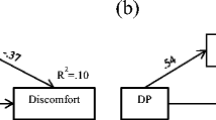Abstract
This study examined the effects of gratitude journaling on first-year college students’ adjustment, life satisfaction, and positive affect. Students who scored high (i.e., scores between 35 and 56) on the Perceived Stress Scale (Cohen et al. in Journal of Health and Social Behavior, 24, 385–396, 1983) and low (i.e., scores between 48 and 144) on the University Life Scale (Aladağ et al. in Türk Psikolojik Danışma ve Rehberlik Dergisi, 2(20), 41–47, 2003) were invited to participate in the study. Among the 24 students who met the criteria, 21 volunteered to participate. Students in the experimental group (11) kept a gratitude journal for 3 weeks, whilst those in the control group (10) were not involved in any gratitude-related activity. Results indicated that students in the experimental group had significantly higher post-test scores on gratitude, adjustment to university life, life satisfaction, and positive affect. Results related to gratitude interventions, positive emotions and college student adjustment are discussed.
Similar content being viewed by others
References
Aladağ, M., Kağnıcı, D. Y., Tuna, M. E., & Tezer, E. (2003). Üniversite yaşamı ölçeği: ölçek geliştirme ve yapı geçerliliği üzerine bir çalışma. Türk Psikolojik Danışma ve Rehberlik Dergisi, 2(20), 41–47.
Allan, B. A., Steger, M. F., & Shin, J. Y. (2013). Thanks? Gratitude and well-being over the Thanksgiving holiday among college students. Journal of Positive Psychology, 8(2), 91–102.
Alpan, A. (1992). Cumhuriyet üniversitesi ve Erciyes üniversitesi fen edebiyat fakültesi öğrencilerinde çevreye ve üniversiteye uyum sorunları. Yayımlanmamış Yüksek Lisans Tezi. Cumhuriyet University Social Sciences Institute, Sivas, Turkey.
Aypay, A., Aypay, A., & Demirhan, G. (2009). Ögrencilerin üniversiteye sosyal uyumu: Bir üniversite örneği. Usak Üniversitesi Sosyal Bilimler Dergisi, 2, 46–64.
Barefoot, B. (2000). The first-year experience – are we making it any better? About Campus, 4, 12–18.
Bayrak, A. Ö., & Bülbül, T. (2013). Meslek yüksekokulu ögrencilerinin yüksekögretim yasamına uyum düzeylerinin cesitli degiskenlere göre incelenmesi. Sakarya Üniversitesi Egitim Bilimleri Enstitüsü Dergisi, 3(2), 6–20.
Bower, J. E., Moskowitz, J. T., & Epel, E. (2009). Is benefit finding good for your health? pathways linking positive life changes after stress and physical health outcomes. Current Directions in Psychological Science, 6, 337.
Brooks, J., & DuBois, D. L. (1995). Individual and environmental predictors of adjustment during the first year of college. Journal of College Student Development, 36, 347–360.
Bulbul, T., & Acar Guvendir, M. (2014). Üniversite birinci sınıf öğrencilerinin yükseköğretim yaşamına uyum düzeylerinin incelenmesi. Journal of Educational Sciences Research, 4, 397–418.
Cherian, V. I., & Cherian, L. (1998). University students’ adjustment problems. Psychological Reports, 82, 1135–1138.
Cohen, S., Kamarck, T., & Mermelstein, R. (1983). A global measure of perceived stress. Journal of Health and Social Behavior, 24, 385–396.
D’Zurilla, T. J., & Sheedy, C. F. (1991). Relation between social problem-solving ability and subsequent level of psychological stress in college students. Journal of Personality & Social Psychology, 61(5), 841.
Datu, J. (2014). Forgiveness, gratitude and subjective well-being among Filipino adolescents. International Journal for the Advancement of Counselling, 36(3), 262–273.
Deniz, M. E., Avşaroğlu, S., & Hamarta, E. (2004). Psikolojik danışma servisine başvuran üniversite öğrencilerinin psikolojik belirti düzeylerinin incelenmesi. Selçuk Üniversitesi Eğitim Fakültesi Dergisi, 16, 139–152.
Diener, E., Emmons, R. A., Larsen, R. J., & Griffin, S. (1985). The satisfaction with life scale. Journal of Personality Assessment, 49(19), 71–75.
Doğan, T. (2012). A long-term study of the counseling needs of Turkish university students. Journal of Counseling & Development, 90, 91–96.
Emmons, R. A., & McCullough, M. E. (2003). Counting blessings versus burdens: an experimental investigation of gratitude and subjective well-being in daily life. Journal of Personality & Social Psychology, 84(2), 377.
Emmons, R. A., & Stern, R. (2013). Gratitude as a psychotherapeutic intervention. Journal of Clinical Psychology, 69(8), 846–855.
Fredrickson, B. L. (2001). The role of positive emotions in positive psychology. American Psychologist, 56, 218–226.
Fredrickson, B. L. (2003). The value of positive emotions. American Scientist, 91, 330–335.
Fredrickson, B. L. (2004). The broaden-and-build theory of positive emotions. Philosophical Transactions: Biological Sciences, 359, 1449–1367.
Fredrickson, B. L. (2006). Unpacking positive emotions: investigating the seeds of human flourishing. Journal of Positive Psychology, 1(2), 57–59.
Fredrickson, B.L. (2013). Chapter one: positive emotions broaden and build. Advances in Experimental Social Psychology, 471–53.
Froh, J. J., Sefick, W. J., & Emmons, R. A. (2008). Counting blessings in early adolescents: an experimental study of gratitude and subjective well-being. Journal of School Psychology, 46, 213–233.
Gençöz, T. (2000). Pozitif ve negatif duygu ölçegi: geçerlik ve güvenirlik çalışması. Türk Psikoloji Dergisi, 15(46), 19–26.
Gerdes, H., & Mallfinckrodt, B. (1994). Emotional, social and academic adjustment of college students: a longitudinal study of retention. Journal of Counseling and Development, 72, 281–287.
Gifford, D. D., Briceno-Perriot, J., & Mizano, F. (2006). Locus of control: academic achievement and retention in a sample of university first-year students. Journal of College Admission, 191, 18–25.
Kağıtçıbaşı, C. (1996). The autonomous-relational self: a new synthesis. EuropeanPsychologist, 1, 180–186.
Kagitcibasi, C. (2005). Autonomy and relatedness in cul- tural context: implications for self and family. Journal of Cross-Cultural Psychology, 36, 403–422.
Karahan, T. F., Sardoğan, M. E., Özkamalı, E., & Dicle, A. N. (2005). Üniversite 1. sınıf ögrencilerinin üniversite yasamına uyum düzeylerinin denetim odagı ve atılganlık düzeyi acısından incelenmesi. Dokuz Eylül Üniversitesi Buca Egitim Fakültesi Dergisi, 18, 6–15.
Kerr, S., Johnson, V. K., Gans, S. E., & Krumrine, J. (2004). Predicting adjustment during the transition to college: alexithymia, perceived stress, and psychological symptoms. Journal of College Student Development, 45(6), 593.
Köker, S. (1991). Normal ve sorunlu ergenlerin yaşam doyumu düzeyinin karşılaştırılması. Yayımlanmamış Yüksek Lisans Tezi, Ankara Üniversitesi, Sosyal Bilimler Enstitüsü, Ankara.
Kong, F., Ding, K., & Zhao, J. (2015). The relationships among gratitude, self-esteem, social support and life satisfaction among undergraduate students. Journal of Happiness Studies, 16(2), 477–489.
Lin, J., & Yi, K. (1997). Asian international students’ adjustment: issues and program suggestions. College Student Journal, 31, 473–479.
Marsh, K. (2004). Emerging trends in college mental health. Student Health Spectrum, 2–7.
McCraty, R., Atkinson, M., & Tomasino, D. (2003). Impact of a workplace stress reduction program on blood pressure and emotional health in hypertensive employees. Journal of Alternative & Complementary Medicine, 9(3), 355.
McCullough, M. E., Emmons, R. A., & Tsang, J. (2002). The grateful disposition: a conceptual and empirical topography. Journal of Personality and Social Psychology, 82, 112–127.
Mercan, C. S., & Yıldız, S. A. (2011). Egitim Fakültesi birinci sınıf ögrencilerinin üniversiteye uyum düzeylerinin farklı degıskenler acısından incelenmesi. Hasan Ali Yücel Egitim Fakültesi Dergisi, 16, 135–154.
Mofidi, T., El-Alayli, A., & Brown, A. A. (2014). Trait gratitude and grateful coping as they relate to college student persistence, success and integration in school. Journal of College Student Retention: Research, Theory & Practice, 16(3), 325–349.
Mudhovozi, P. (2012). Social and academic adjustment of first-year university students. Journal of Social Science, 33(2), 251–259.
Mustaffa, C., & Ilias, M. (2013). Relationship between students adjustment factors and cross cultural adjustment: a survey at the northern university of Malaysia. Intercultural Communication Studies XXII, 1, 279–300.
Nelson, C. (2009). Appreciating gratitude: can gratitude be used as a psychological intervention to improve individual well-being? Counselling Psychology Review, 24(3/4), 38.
Oğuz- Duran, N., & Tan, Ş. (2013). Minnettarlık ve yaşam amaçları yazma çalışmalarının öznel iyi oluşa etkisi. Türk Psikolojik Danışma ve Rehberlik Dergisi, 5(40), 154–166.
Ouweneel, E., Le Blanc, P. M., & Schaufeli, W. B. (2014). On being grateful and kind: results of two randomized controlled trials on study-related emotions and academic engagement. The Journal of Psychology: Interdisciplinary and Applied, 148, 37–60.
Özbay, Y., Terzi, Ş., Erkan, S., & Cihangir-Çankaya, Z. (2011). Üniversite öğrencilerinin profesyonel yardım arama tutumları, cinsiyet rolleri ve kendini saklama düzeyleri. Eğitim ve Öğretim Dergisi, 1(4), 59–71.
Özgüven, İ.E. (1989). Üniversite Öğrencilerinin Uyum Sorunları ve Baş Etme Yolları, Proceedings from I. Üniversite Gençliğinde Uyum Sorunları Sempozyumu, Ankara, Turkey.
Ozkan, S., & Yılmaz, E. (2010). Üniversite öğrencilerinin üniversite yaşamına uyum durumları (Bandırma Örnegi). Fırat Saglık Hizmetleri Dergisi, 5(13), 153–171.
Öztemel, K. (2010). Teknik Eğitim Fakültesi öğrencilerinin uyum düzeylerinin incelenmesi. Politeknik Dergisi, 13(4), 319–325.
Paul, E. S., & Brier, S. (2001). Friendsickness in the transition to college: precollege predictors and college. Journal of Counseling and Development, 79(1), 77–89.
Pritchard, M. E., & Wilson, G. S. (2003). Using emotional and social factors to predict student success. Journal of College Student Development, 44, 18–28.
Rash, J. A., Matsuba, K. M., & Prkachin, K. M. (2011). Gratitude and well-being: who benefits most from a gratitude intervention. Applied Psychology. Health and Well-Being, 3, 350–369.
Rickwood, D., Deane, F. P., Wilson, C. J., & Ciarrochi, J. V. (2005). Young people’s help-seeking for mental health problems. Australian e-Journal for the Advancement of Mental Health, 4(3), 1–34.
Ross, S. E., Niebling, B. C., & Heckert, T. M. (1999). Sources of stress among college students. College Student Journal, 33, 312–318.
Sapmaz, F., Yıldırım, M., Sızır, U., Nalbant, D., Topcuoğlu, P., & Horuz, N. (2014). Üniversite Öğrencilerinin Öznel İyi Oluşlarının Minnettarlık, Affedicilik ve Alçakgönüllük ile Yordanması. Proceedings from ERPA 2014 International Congresses on Education İstanbul University, İstanbul, Turkey.
Seligman, M. E. P., Steen, T. A., Park, N., & Peterson, C. (2005). Positive psychology progress: empirical validation of interventions. American Psychologist, 60, 410–421.
Seligman, M. P., Rashid, T., & Parks, A. C. (2006). Positive psychotherapy. American Psychologist, 61(8), 774–788.
Sevinç, S. (2010). Mersin Üniversitesi birinci sınıf öğrencilerinin kişisel ve kurumsal uyumlarını olumsuz etkileyen faktörlerin incelenmesi. Unpublished Masters Thesis. Mersin University Social Sciences Institute, Mersin, Turkey.
Sevinc, S., & Gizir, C. A. (2014). Üniversite birinci sınıf öğrencilerinin bakış açılarından üniversiteye uyumu olumsuz etkileyen faktörler (Mersin Üniversitesi Örnegi). Kuram ve Uygulamada Eğitim Bilimleri, 14(4), 1285–1308.
Sheldon, K. M., & Lyubomirsky, S. (2006). How to increase and sustain positive emotion: the effects of expressing gratitude and visualizing best possible selves. Journal of Positive Psychology, 1, 73–82.
Sivis-Cetinkaya, R. (2013). Turkish college Students’ subjective wellbeing in regard to psychological strengths and demographic variables: implications for college counseling. International Journal for the Advancement of Counselling, 35(4), 317–330.
Smith, P. B., Bond, M. H., & Kagitcibasi, C. (2006). Understanding social psychology across cultures: living and working in a changing world. Thousand Oaks: Sage Publications.
Sun, R. R., Lu, L., Liu, M., Cao, Y., Li, X. C., Liu, H., . . . Zhang, P. Y. (2014). Biomarkers and heart disease. European Review for Medical and Phar- macological Sciences, 18, 2927–2935.
Toepfer, S. M., & Walker, K. (2009). Letters of gratitude: improving well-being through expressive writing. Journal of Writing Research, 1(3), 181.
Ventura, J. N., & Boss, P. G. (1983). The family coping inventory applied to parents with new babies. Journal of Marriage And The Family, 45(4), 867–75.
Watkins, P. C., Woodward, K., Stone, T., & Kolts, R. L. (2003). Gratitude and happiness: development of a measure of gratitude and relationship with subjective well-being. Social Behavior & Personality: An International Journal, 31(5), 431–452.
Watson, D., Clark, L. A., & Tellegen, A. (1988). Development and validation of brief measure of positive and negative affect: the PANAS Scale. Journal of Personality and Social Psychology, 54, 1063–1070.
Wood, A. M., Maltby, J., Gillett, R., Linley, P. A., & Joseph, S. (2008). The role of gratitude in the development of social support, stress, and depression: Two longitudinal studies. Journal of Research In Personality, 42, 854–871.
Wood, A. M., Joseph, S., & Maltby, J. (2009). Gratitude predicts psychological well-being above the Big Five facets. Personality And Individual Differences, 46, 443–447.
Yerlikaya, E.E. & İnanç, B. (2007). Algılanan Stres Ölçeğinin Türkçe Çevirisinin Psikometrik Özellikleri, IX. Ulusal Psikolojik Danışma ve Rehberlik Kongresi, 17–19 Ekim, İzmir.
Yüksel, A., & Oğuz Duran, N. (2012). Turkish adaptation of the gratitude questionnaire. Egitim Arastirmaları-Eurasian Journal of Educational Research, 46, 199–216.
Author information
Authors and Affiliations
Corresponding author
Ethics declarations
Conflict of Interest
The authors have no affiliations with any organization with any financial or non-financial interest in the subject matter or no possible conflict of interest.
Rights and permissions
About this article
Cite this article
Işık, Ş., Ergüner-Tekinalp, B. The Effects of Gratitude Journaling on Turkish First Year College Students’ College Adjustment, Life Satisfaction and Positive Affect. Int J Adv Counselling 39, 164–175 (2017). https://doi.org/10.1007/s10447-017-9289-8
Published:
Issue Date:
DOI: https://doi.org/10.1007/s10447-017-9289-8




